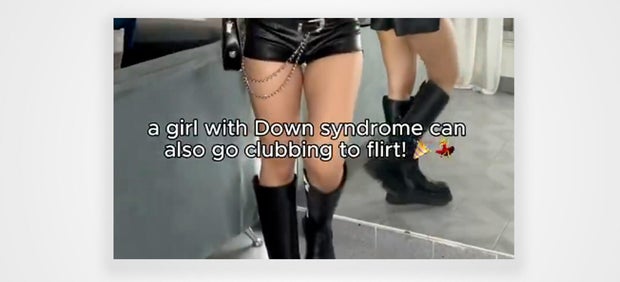AI-generated accounts impersonating people with Down syndrome are spreading across social media, according to an analysis by CBS News Confirmed. Many of these artificial intelligence-backed profiles are gaining followers faster than real disability advocates — and they’re making money from it.
These fake accounts use feel-good messages, dance to trending songs, and thank their followers for supporting their journeys.
One video is captioned, “Be proud of yourself and your differences!”
“So grateful I never gave up on my dream,” reads another post.
But the people featured in these accounts aren’t real.
CBS News Confirmed identified more than 30 accounts impersonating people with Down syndrome across Instagram, YouTube and TikTok. Some used deepfakes or AI faceswaps. Others mimicked real disability advocates’ language and repackaged it to pass as authentic. Only a few accounts disclosed the use of AI.
AI for clicks and cash
Down syndrome communities have built strong followings on social media, using well-known hashtags like #DownSyndrome and #DownSyndromeAwareness to connect and share their stories. Imposters exploit those same tags to appear alongside real advocates.
Many of the imposter accounts identified by CBS News posted videos on TikTok and Instagram using flirty or emotional captions to grab attention.
“A girl with Down syndrome can also go clubbing to flirt!” text superimposed on one post reads.
Other accounts shared videos responding to fabricated criticism in order to boost engagement and go viral.
One account, calling itself “the NUMBER 1 DS creator🥇,” used its profile — populated with Down syndrome content and having more than 130,000 followers — to promote her content on an adults-only site. CBS News reached out to the account’s owner, who went by the name “Sara” and said, “Yeah, I make good money from it.”
Another well-known account, with more than 100,000 followers, claimed to raise money for the National Down Syndrome Society (NDSS), one of the nation’s leading advocacy groups. But the videos it shared featured a face that looked blurry and distorted, with telltale signs of AI. An NDSS spokesperson told CBS News they did not know this person and did not ask them to raise funds for the group. The account was later taken down.
AI impersonators stealing others’ stories is “not right”
For people with Down syndrome, these fake accounts can feel like a new level of discrimination — one where their lived experiences are copied, exaggerated and monetized.
“It’s not right to steal our stories just to get attention online,” said Alex Bolden, who works for NDSS.
Bolden, who has Down syndrome himself, told CBS News he’s spent years working to build his 24,000 followers on Instagram — a number some impersonators have achieved in just a few months.
“Those are our stories. I work so hard to advocate and share my journey online and I can’t believe people would try to take that away from me,” he said.
“It’s a disturbing trend,” Michelle Sagan, who leads communications at NDSS, told CBS News. “I’ve seen my friends’ faces used in AI posts more than once.”
Approximately 5,700 people are born with Down syndrome every year, according to the Centers for Disease Control and Prevention.
At their annual advocacy conference held in Washington, D.C., last week, multiple advocates agreed that only individuals with Down syndrome should be the ones to tell their stories.
“While there are many reasons why these fake accounts are wrong, the principle here is that individuals with Down syndrome are the only people who should be speaking about what it’s like to have Down syndrome,” NDSS President & CEO Kandi Pickard told CBS News.
She said these influencers are not only impersonating someone’s identity, but also exploiting a community that’s already fighting to be heard.
“There is still so much work to be done to ensure that individuals with Down syndrome are included and respected in society,” Pickard said.
How have Meta, TikTok and YouTube responded?
CBS News reached out to Meta, TikTok and YouTube for comment on how each platform is addressing AI-generated content that impersonates people with disabilities.
“Our Community Standards apply to all content posted on our platforms regardless of whether it’s AI-generated, and we take action against any content that violates these policies,” a Meta spokesperson told CBS News.
Each platform found that the accounts pointed out by CBS News had violated their policies, and removed or banned them after our inquiries. But many others still exist.
Stopping the spread of AI-generated accounts is a moving target, as even when an account is taken down, another one can quickly appear. And, unlike real creators, these fake influencers don’t need rest or time off. They generate new content instantly, flooding feeds and pushing real people on social platforms deeper into the margins.
“We need everyone’s help identifying and reporting these fake accounts as they continue to arise,” Pickard said, adding that she hopes social media platforms take stronger action to stop it.


